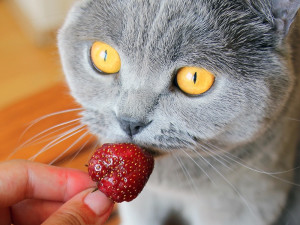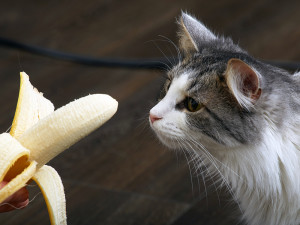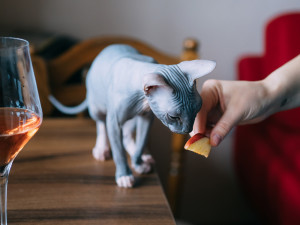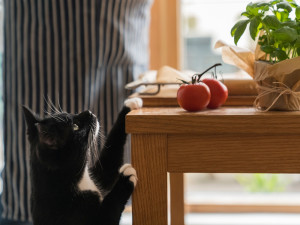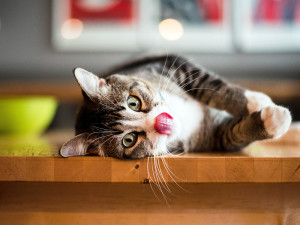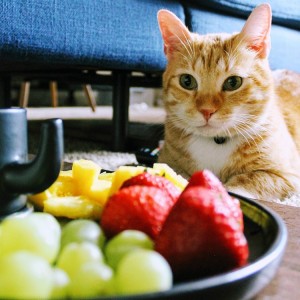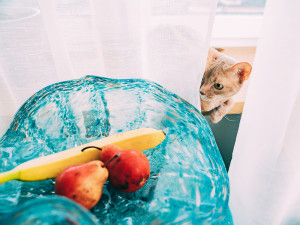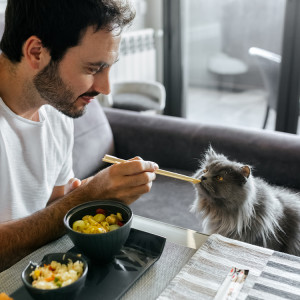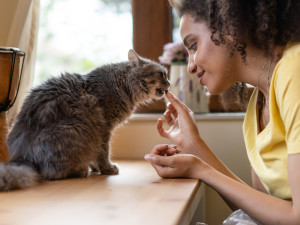Can Cats Eat Pomegranates?
Vets want them to steer clear. Here’s why.
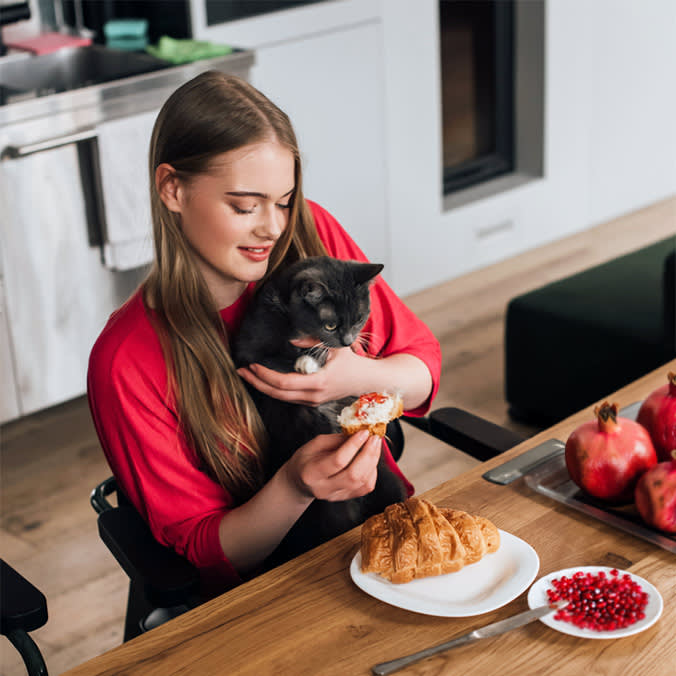
share article
Pomegranates are one of the oldest fruits in the world — with references to the fruit appearing as far back as the Bible (if you ask me, Eve didn’t risk paradise for some boring apple). But just how forbidden is this forbidden fruit?
Can cats eat pomegranates? Yes, cats can eat pomegranates because the fruit is non-toxic to them. But vet Dr. Lindsay Butzeropens in a new tab doesn’t exactly recommend doling out a spoonful of seeds into their food bowl. Here’s why.
Are pomegranates toxic to cats?
No, pomegranates aren’t toxic to cats; however, the seeds can be a choking hazard, especially if your kitty eats several at a time. That said, if your cat swipes a few while you’re not looking or successfully swallows a few from the floor, the seeds will not harm them.
Are pomegranates good for cats?
No, pomegranates are not good for cats. Due to their genetic makeup, they don’t require the same vitamins and minerals that make pomegranates a healthy snack for the rest of us. “Cats can technically eat pomegranates, but it’s not recommended,” Dr. Butzer tells The Wildest. “Pomegranates are also quite sour, and cats may not even like the taste, but some cats who like to try everything may eat it!”
If your cat falls into that category, try to avoid allowing them to eat pomegranates. In addition to being a choking hazard, the seeds can be quite filling, and your kitty needs to save room for food that will provide them with the nutrients they need.
What should I do if my cat has eaten pomegranates?
Pomegranates are non-toxic to cats, so no need to worry if they accidentally eat some of the fruit. However, in larger quantities, the seeds could cause digestive upset in your cat; their body is not used to digesting this type of food. If you suspect they have eaten seeds and are experiencing GI upsetopens in a new tab, contact your vet for next steps.
How do I stop my cat from eating pomegranates?
If your cat can’t resist the siren call of this fruit, you might need to take precaution to keep them safe. Don’t leave pomegranate seeds unattended on counters or tables, and always dispose of them in a trash can or receptacle that your curious little buddy cannot access. Store pomegranate seeds in the fridge, as is recommended.
What are some fruits that are safe for cats?
Blueberries: Blueberries, in small dosesopens in a new tab, can provide vitamin C, vitamin K, fiber, and more. Some cat foods even list blueberries in the ingredients. Just be sure to cut blueberries into small enough pieces.
Strawberries: Strawberries can be a great source of fiberopens in a new tab. Just like with blueberries, make sure to cut strawberries into small pieces and serve the fruit to them in small quantities.
Watermelon: Because they’re made of 90 percent water, watermelon is a great source of hydrationopens in a new tab. Especially if you have one of those felines who inexplicably go on water-strikeopens in a new tab, watermelon can provide them with some much-needed hydration. Just make sure to dispose of the rind and seeds. Those can be toxic to your cat.
What are some other fruits that are not safe for cats?
Grapes and raisins: Grapes and raisins are extremely toxic opens in a new tabto both cats and dogs, though experts are still unsure why. Keep all raisins and grapes up and away from cats, preferably in cabinets and not just on counters where they can reach them. If you see or suspect your kitty has eaten grapes or raisins, contact your vet immediately.
Citrus fruits: Citrus fruits contain essential oils which are incredibly toxic for catsopens in a new tab. Essential oil toxicity can occur if your kitty ingests the fruit or gets oils from the fruit on their fur or paws. This type of toxicity exists on a wide spectrum, so the less your cat makes contact with these fruits, the better.
The bottom line: Are pomegranates poisonous for my cat?
Pomegranates are essentially safe for cats, but this fruit should probably stay somewhere out of their reach. “To be honest, there aren’t any significant health benefits for cats when it comes to eating pomegranate,” Dr. Butzer says.
“Cats need a diet rich in animal proteins, and pomegranates don’t provide that. It's best to stick to a well-balanced, high-quality cat food for their nutritional needs.”
So, while you shouldn’t worry if your kitty snags a few seeds, try to stick to specifically formulated treats when looking for snacks for them.
FAQs (People also ask):
Are pomegranates toxic to cats?
No, pomegranates are not toxic to your cat. However, seeds could be a choking hazard and large quantities could result in some stomach upset.
Are pomegranates good for cats?
Pomegranates don’t hold any nutritious value for cats. They require an animal-protein based diet in order to get the nutrition they need.
Why do cats like pomegranates?
Cats don’t have sweet receptors, so it’s unlikely they’d be consistently interested in pomegranates. Still, they are curious, and these seeds can look like small treats to the untrained eye (of a cat who really likes treats).
References:
Sugars, Sweet Taste Receptors, and Brain Responsesopens in a new tab

Rebecca Caplan
Rebecca Caplan is a writer based in Brooklyn whose work has been featured in The New Yorker, Reductress, and Vulture. She lives in Brooklyn with her perfect, toothless dog Moose.
Related articles
![Cat laying on his side with catnip around him, on the kitchen table licking his lips.]() opens in a new tab
opens in a new tabCan Cats Eat Catnip?
They’re definitely pulling for the answer to be an emphatic “yes,” but...not so fast.
![a cat stares at green grapes on a plate]() opens in a new tab
opens in a new tabCan Cats Eat Grapes?
This is one you’ll want to bookmark.
![Cat eating from a plate of raspberries and blueberries]() opens in a new tab
opens in a new tabCan Cats Snack on Blueberries?
Go ahead and serve up the superfood — with a couple caveats.
![Cat behind a curtain attempting to get fruit in blue bowl]() opens in a new tab
opens in a new tabWhat Fruits and Veggies Can Your Cat Feast On?
Pass the fruit bowl — it’s treat time.
![Man feeding rice to cat with chopsticks at dinner table]() opens in a new tab
opens in a new tabCan Cats Eat Rice?
A warm bowl of rice is your cat’s version of comfort food.
![woman feeding cat a treat]() opens in a new tab
opens in a new tabHow Many Treats Is Too Many For Your Cat?
Despite what your cat thinks, jerky treats all day, every day, is not the answer.
